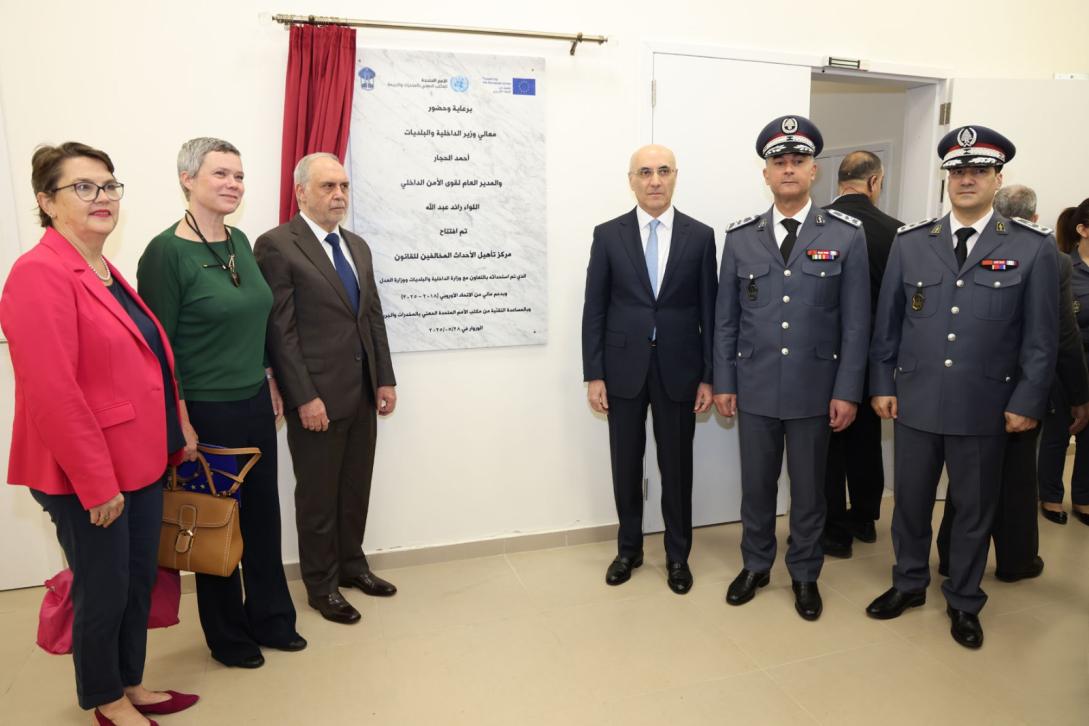Inauguration of an EU Funded Rehabilitation Centre for Boys in Conflict with the Law

On Wednesday, 28 May 2025, Lebanon took a concrete step in juvenile justice reform with the inauguration of an EU funded rehabilitation centre for boys in conflict with the law, in Warwar, Beirut.
In line with international standards and practices, this new space replaces the traditional institutional feel with a welcoming environment, featuring thoughtful architecture, functional design and inspiring murals painted by youth. The centre will provide a safe, child-friendly environment for around 100 juveniles currently held in the juvenile wing in Roumieh prison, marking a permanent move away from the adult facility. Boys will receive tailored rehabilitation programmes, including social and psychological support, to assist their successful reintegration into society.
This initiative is the result of years of collaboration between the Ministry of Interior and Municipalities, the Internal Security Forces, the European Union, and the United Nations Office on Drugs and Crime, driven by a shared vision of supporting children in conflict with the law.

© European Union, 2025
The inauguration was attended by H.E. Minister of Interior and Municipalities Ahmad Al Hajjar; Director General of the Internal Security Forces, Major General Raed Al Abdallah; Director General of the Ministry of Justice, Judge Mohammad El Masri; EU Ambassador to Lebanon, H.E. Sandra De Waele; and UNODC Regional Representative for the Middle East and North Africa, Ms. Cristina Albertin. They were joined by senior Lebanese officials, members of the judiciary, and civil society partners.
In his speech, H.E. Minister Ahmad Al Hajjar highlighted the importance of this moment for the Ministry of Interior and Municipalities. “Today, we inaugurate a centre dedicated to a group that is often fragile and vulnerable: our youth. But this is more than just the opening of a building. This centre represents a space of hope and new opportunities for children who have lost their way. It is a space where they can rediscover their potential and reintegrate into society as productive and empowered individuals. We recognize the complex social and psychological factors that may lead some juveniles to engage in unlawful behaviour. That is why we have chosen to pursue a reformative, rather than punitive, approach. It is our duty - as the State of Lebanon - to provide these young people with the environment, support, and resources they need to rebuild their lives and reclaim their future.”
The Director General of the Ministry of Justice, representing the Ministry, Judge Mohammad El Masri, emphasized that the inauguration of the Rehabilitation Center is more than a moment of celebration - it is a moment for reflection, review, and a serious step on Lebanon’s path toward restorative justice. He stated: “The Juvenile Justice Department at the Ministry of Justice is entrusted with overseeing the effective implementation of rehabilitation programmes for juveniles and coordinating with civil society organizations to ensure comprehensive support.”
The Director General of the Internal Security Forces, Major General Raed Al Abdallah highlighted the operational impact of this achievement “The goal of this initiative is to accommodate juveniles in an independent facility, where they are supported through advanced, quality-driven rehabilitative practices.” In his speech, Major General Al Abdallah emphasized the strategic significance of the centre, underscoring Lebanon’s dedication to upholding the best interests of the child and enabling young individuals to rebuild their lives through education, psychosocial support, and vocational training’’.
Improving detention conditions for youth is one of several key pillars of the European Union’s ongoing support. The EU has also funded the establishment of child-friendly facilities in Palaces of Justice across the country and supported capacity-building programmes for judges specialising in child justice. EU Ambassador Sandra De Waele stated: “This centre not only meets international standards, but it also provides a child-friendly, supportive environment that aims to boost the mental, emotional, and physical well-being of the children and youth. This is not only good for them, but it is also good for the Lebanese society as a whole. Creating an environment conducive to their rehabilitation and reintegration will reduce their chances of relapsing. It will show them that they have another chance, an opportunity to make a new start.”
The new centre builds on a pioneering initiative launched in 2003, when UNODC supported the establishment of a rehabilitation centre for girls in conflict with the law near Dahr el-Bachek Hospital - an effort that laid the foundation for gender-sensitive and child-centred justice in Lebanon. UNODC Regional Representative in the MENA region, Ms. Cristina Albertin emphasised the importance of collaborative efforts that offer children in conflict with the law opportunities for rehabilitation and reintegration, and stated: “The prison door for children in conflict with the law is now closed forever, paving the way for a facility that aligns with UN standards and international best practices, offering a safe, dignified, and supportive environment that fosters rehabilitation and reintegration through meaningful activities and programmes promoting health, self-respect, responsibility, and essential life skills.”
